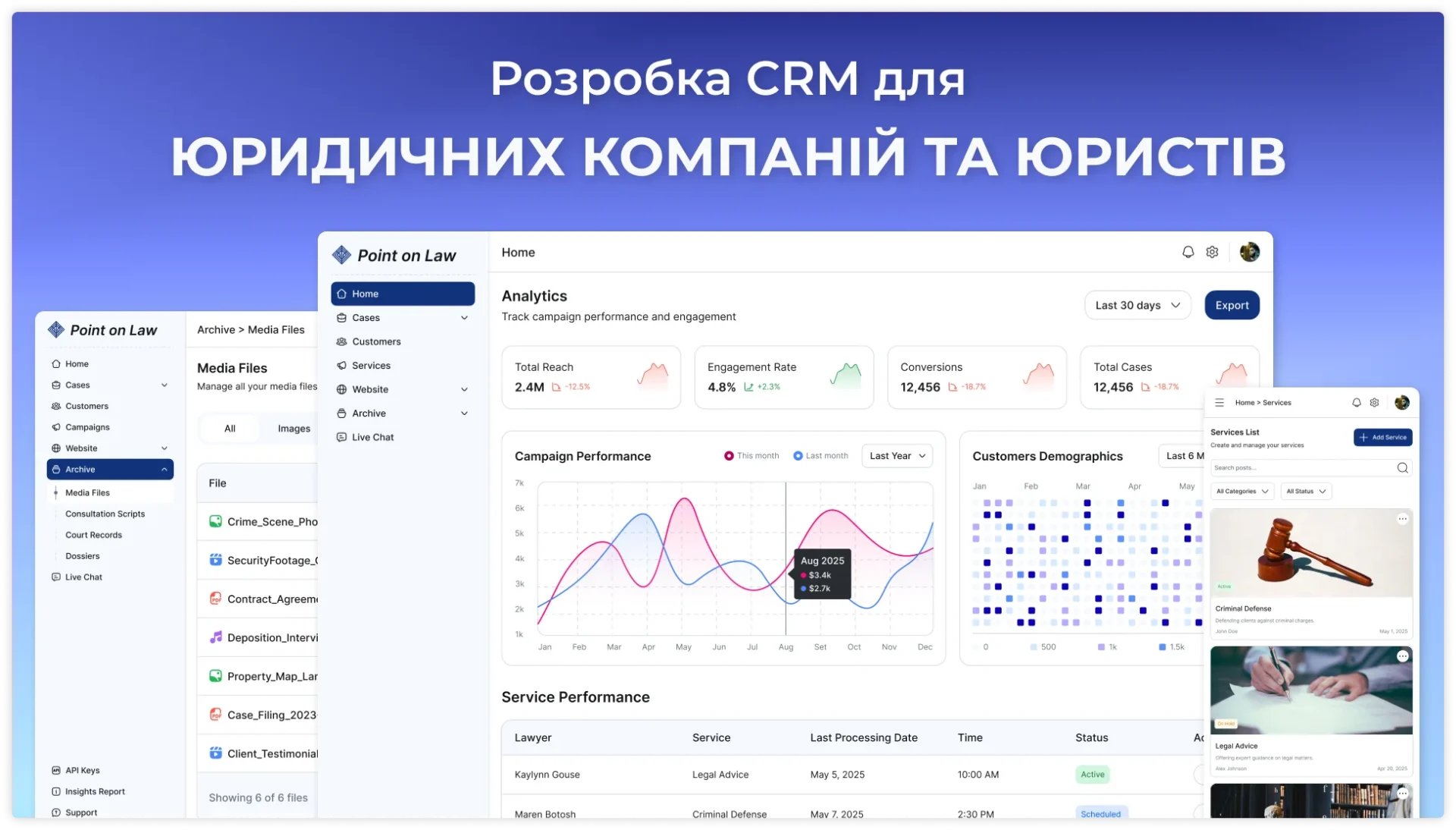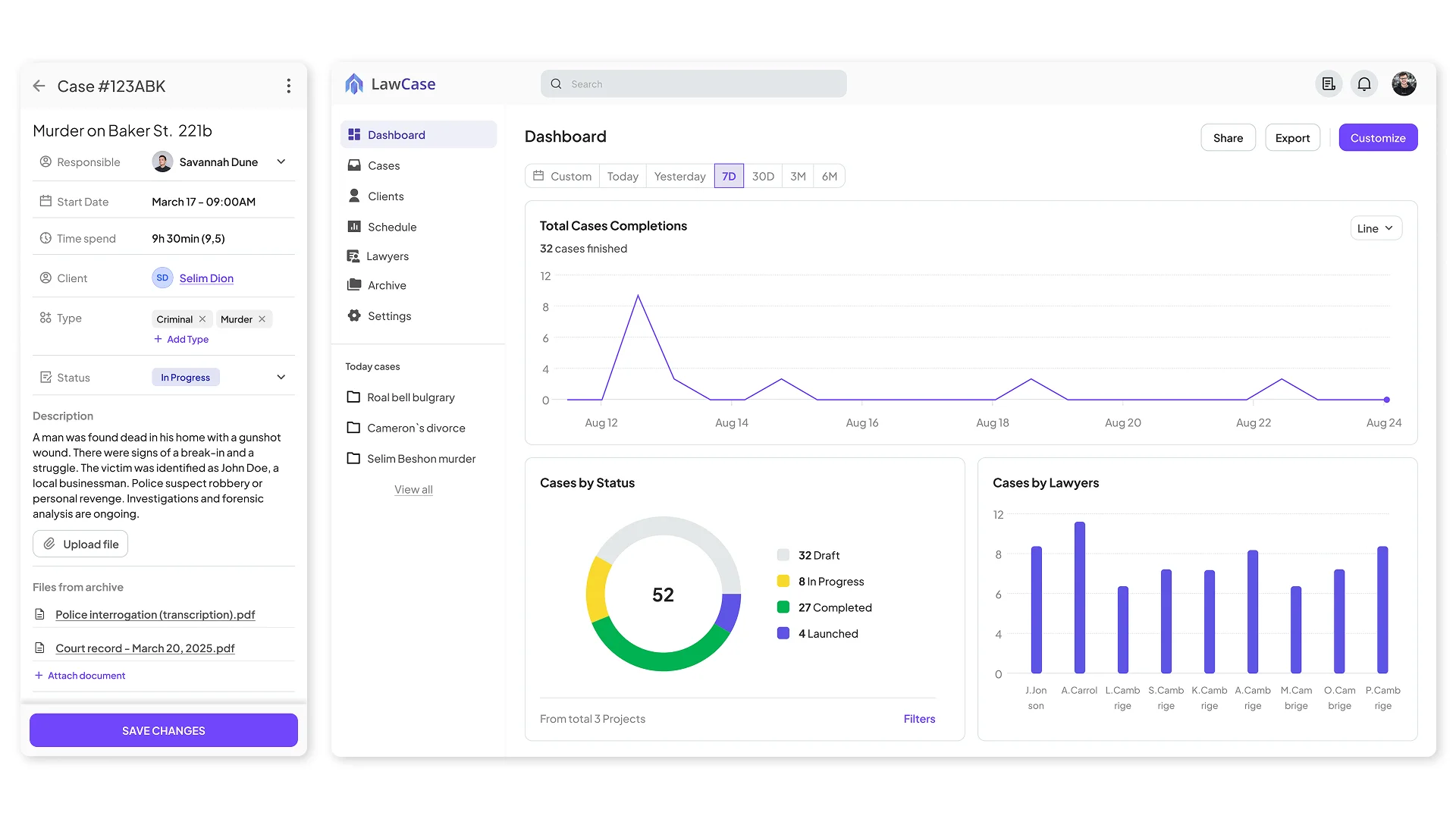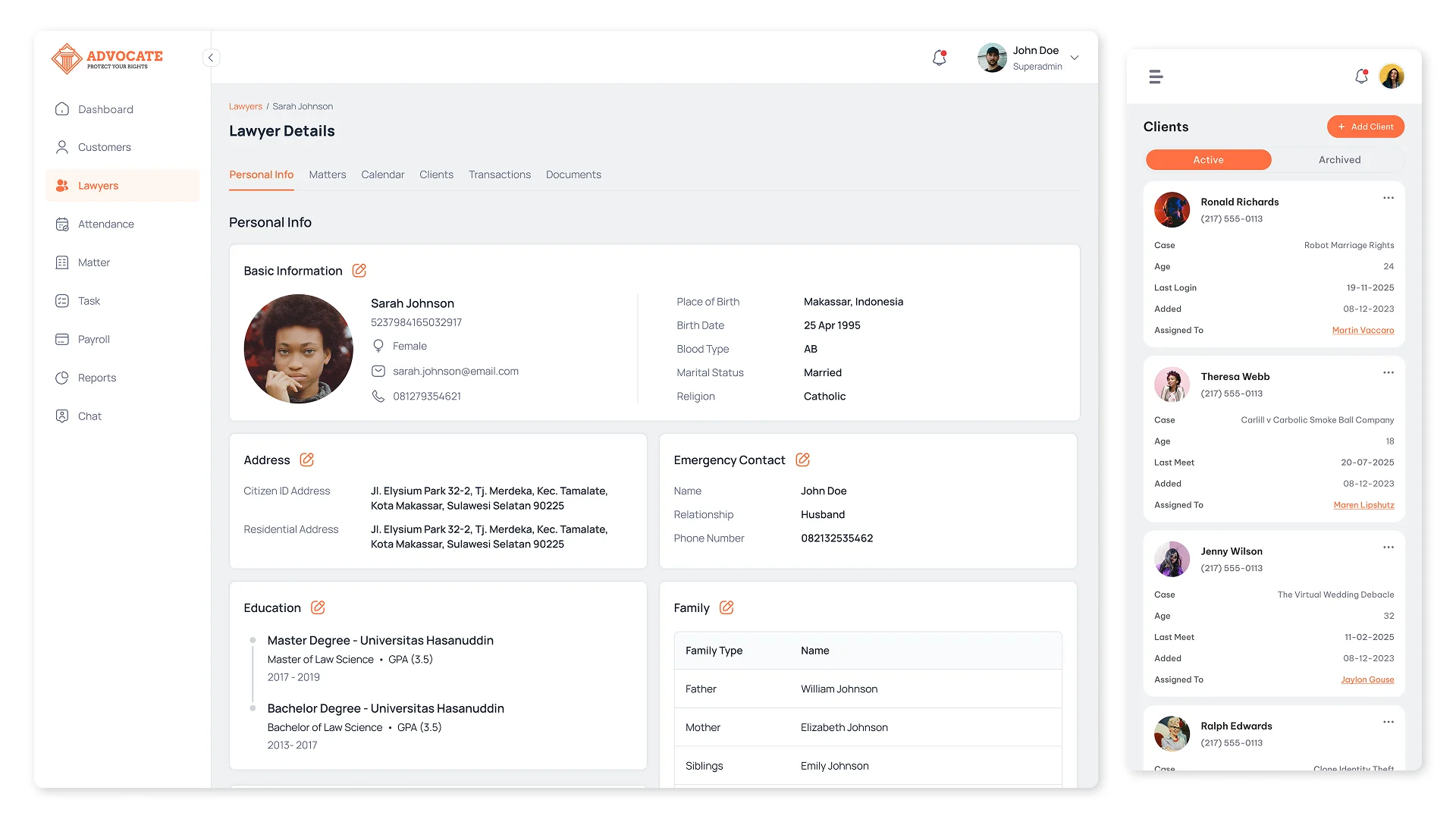
Legal services are always associated with a continuous flow of information, strict deadlines, changes in legislation and increased requirements for accuracy and confidentiality. Where destinies and decisions that affect people’s lives are intertwined, order and efficiency are not just words, but principles of work. While competitors have long digitized processes, it is unreasonable and unprofitable to cope with everything manually.
Modern CRM systems for lawyers are not just a convenient database, but an intelligent tool that takes over the routine, increases productivity and makes legal services even more accurate and efficient. AVADA MEDIA offers comprehensive services for the development and scaling of CRM for lawyers, attorneys and notaries, you can order a tool from us that can bring your practice to a new level.
CRM for lawyers and attorneys is a custom software for automating and improving interaction with clients, managing cases, documents, and other aspects of legal practice. It is not just a customer base for lawyers, but a digital ecosystem that ensures order and efficiency of business.

CRM for a lawyer turns a chaotic flow of information into a structured digital process, where every case, every client and every document is under control. Together with an automated management system, the law firm gets full control over litigation, contracts, meetings and deadlines. This reduces the likelihood of omissions and increases client confidence.
Let’s consider the main tasks of a CRM system for lawyers.
CRM example for a law firm
Automation of legal practice is necessary when manual management of cases and documents slows down work, and it becomes increasingly difficult to control deadlines. If lawyers spend a lot of time on routine, searching for the necessary documents and data, and errors or missed deadlines lead to financial and reputational losses, then it is high time for you to implement CRM for a law firm.
Automating legal processes provides a strategic advantage and an opportunity to focus on what is important – helping people, protecting their rights, and seeking justice. Let’s take a closer look at how automation is transforming legal practice.

The development of CRM for a law firm requires an experienced team, an integrated approach and modern technologies – this is the only way to create high-quality software solutions. Let’s take a closer look at the stages of implementation of such projects.
At the start, a team of specialists immerses themselves in the specifics of your legal practice, studies business processes, identifies problems and needs: what tasks require automation, what tools are already in use, what integrations are needed.
Based on the analysis, a detailed technical specification is formed, which describes the structure of the future program for lawyers, its functionality and integration capabilities. Usually, the management system for a law firm includes modules for maintaining a client base, document management, accounting for court proceedings, deadline reminders, as well as security mechanisms for protecting confidential information. meet the expectations of the client.
At this stage, the system architecture and user scenarios are developed. They create an interactive CRM prototype that simulates key functions: for example, registering a new client, creating a contract, scheduling court hearings, automatic reminders of important events. This allows the customer to assess the convenience of the future system in advance and make adjustments before the start of development.
Guided by the principles of Material Design and Human Interface Guidelines, UX/UI designers develop an intuitive and attractive interface, paying special attention to the visual design, ergonomics, and accessibility of the system. A CRM system for a law firm should be simple and convenient for all users. The user-friendly design implies well-thought-out filters for searching for cases and clients, automatic generation of documents and a logical arrangement of functional elements.
At this stage, developers write program code for the front-end and back-end parts of CRM for a lawyer, using modern technologies and frameworks that ensure the stability and scalability of the system. For the front-end, they use React.js, Vue.js, for the server part – Node.js, Python. PostgreSQL, MongoDB are used as databases to store legal documents and customer records. digital signature services and internal accounting systems. Our teams use an agile development methodology that allows us to respond quickly to changes in requirements and ensure transparency of the process.
Before launching a CRM, QA engineers conduct functional, load, and integration testing, as well as security and UX testing. The purpose of comprehensive testing of the system is to check the correct operation of all modules and fix bugs. Tools such as Selenium, JUnit, and TestNG are used to automate testing.
After successful testing, CRM is deployed on the servers of a law firm or in the cloud infrastructure, data is transferred from existing systems, and integrations are connected. Before launching, it is mandatory to train employees, check the performance of the system in real working conditions and gradually put the new program into operation.
After the launch of the CRM system for the lawyer, it requires regular updates due to changes in legislation and new business needs. This stage includes user support, performance optimization, integration with new services (for example, electronic court or blockchain registries).
CRM for a law service
AVADA MEDIA provides services for individual CRM development for law firms, private lawyers, notary offices and attorneys. We form dedicated teams of specialists who develop the system from scratch or adapt ready-made solutions to specific needs. Experienced analysts, designers, developers who understand the specifics and key processes of legal practice that require automation will work on your project. safe and convenient solutions, helping your company become more efficient, minimize routine and improve service.
What is the cost of developing a custom CRM system for a lawyer?
The price of CRM for lawyers depends on the amount of work, the number of specialists and technologies involved, the complexity of the functionality, and the number of integrations. We provide a transparent estimate so you can plan your budget.
How long does it take to develop a management system?
The terms of CRM development for lawyers depend on the complexity of the project, usually it lasts from 3 months or more. Each stage of development is agreed with the customer. We strive for efficiency, but quality is our priority.
What is the difference between a custom CRM and ready-made solutions?
Ready-made solutions are standard, and a custom CRM is customizable to the unique processes of your business, providing flexibility and accuracy that template solutions cannot offer.
Can your CRM be tailored for a specific area of law?
Yes, CRM systems for lawyers can be adapted to the specifics of any area of law. Individual development allows you to take into account the specifics of criminal, corporate and other practices, making each management system unique.
Do I need to pause workflows to implement CRM?
Implementation takes place in stages to ensure the continuity of your company’s work. The process is controlled and agreed, and downtime takes a minimum of time.
What risks may arise when switching to a new CRM?
When migrating to a new system, you may encounter challenges such as staff resistance, potential data loss during migration, and possible technical failures. A comprehensive approach that includes employee training, data backup, phased commissioning, and technical support for the new CRM helps to minimize these risks and ensure a smooth, comfortable, and secure implementation.
What additional functions can the notary program have?
Your own program is flexibly adapted and scalable. In addition to the basic functions (workflow automation or customer database), it can be integrated with databases of judicial authorities, tools for tracking working hours and implement powerful analytical capabilities.
How is client data protected in CPM for Lawyers?
For protection and privacy, they use advanced data encryption technologies, strict access control, and regular backups.
Can I use CRM on mobile devices?
A CRM system for lawyers is fully mobile-friendly, allowing employees to access the data and tools they need anytime, anywhere.
Our works
Contact the experts Have a question?
Developed by AVADA-MEDIA™
The user, filling out an application on the website https://avada-media.ua/ (hereinafter referred to as the Site), agrees to the terms of this Consent for the processing of personal data (hereinafter referred to as the Consent) in accordance with the Law of Ukraine “On the collection of personal data”. Acceptance of the offer of the Consent is the sending of an application from the Site or an order from the Operator by telephone of the Site.
The user gives his consent to the processing of his personal data with the following conditions:
1. This Consent is given to the processing of personal data both without and using automation tools.
2. Consent applies to the following information: name, phone, email.
3. Consent to the processing of personal data is given in order to provide the User with an answer to the application, further conclude and fulfill obligations under the contracts, provide customer support, inform about services that, in the opinion of the Operator, may be of interest to the User, conduct surveys and market research.
4. The User grants the Operator the right to carry out the following actions (operations) with personal data: collection, recording, systematization, accumulation, storage, clarification (updating, changing), use, depersonalization, blocking, deletion and destruction, transfer to third parties, with the consent of the subject of personal data and compliance with measures to protect personal data from unauthorized access.
5. Personal data is processed by the Operator until all necessary procedures are completed. Also, processing can be stopped at the request of the User by e-mail: info@avada-media.com.ua
6. The User confirms that by giving Consent, he acts freely, by his will and in his interest.
7. This Consent is valid indefinitely until the termination of the processing of personal data for the reasons specified in clause 5 of this document.
Send CV
Contact us in any convenient way for you:
+ 38 (097) 036 29 32